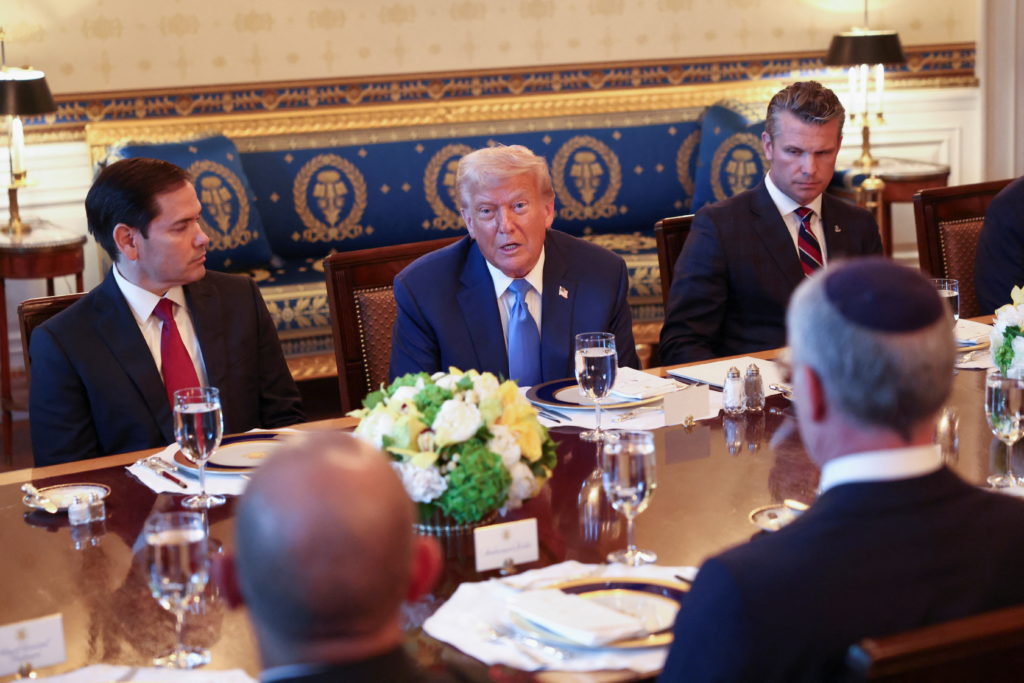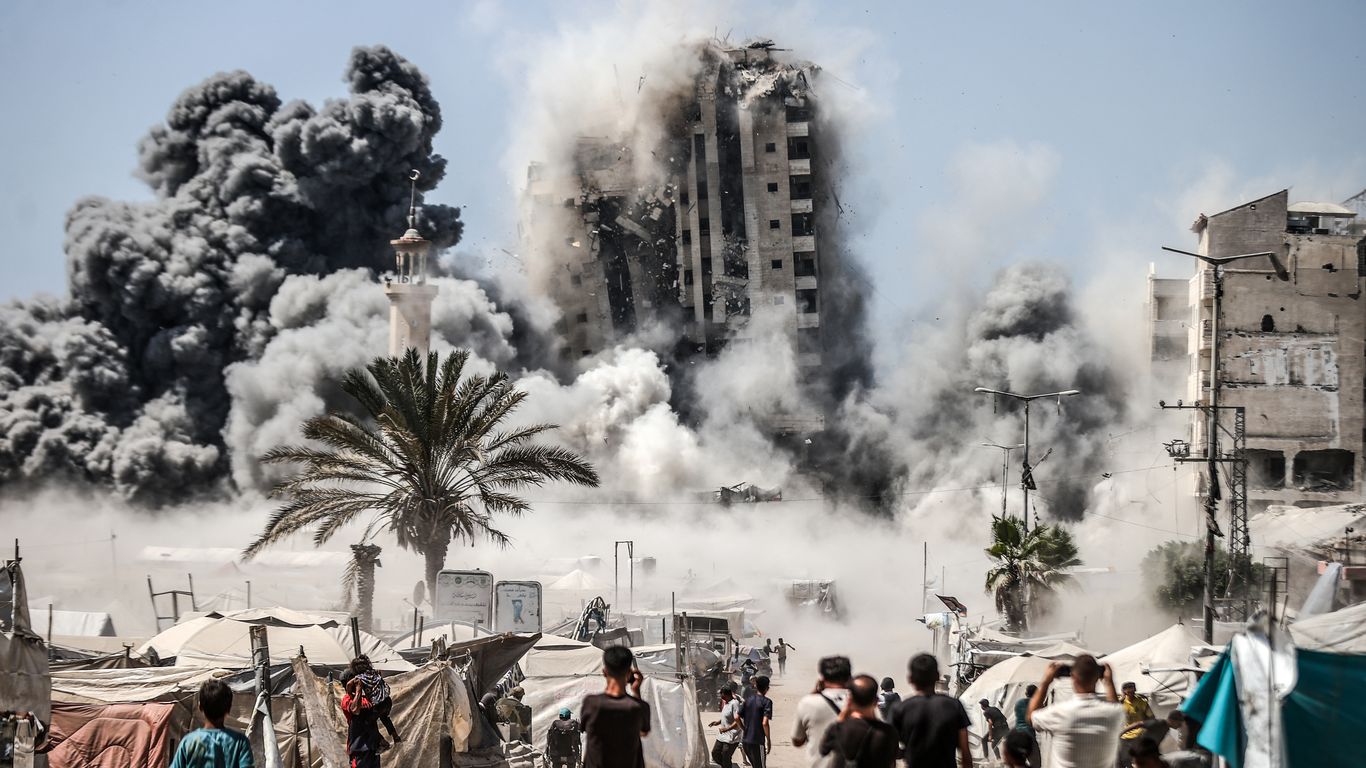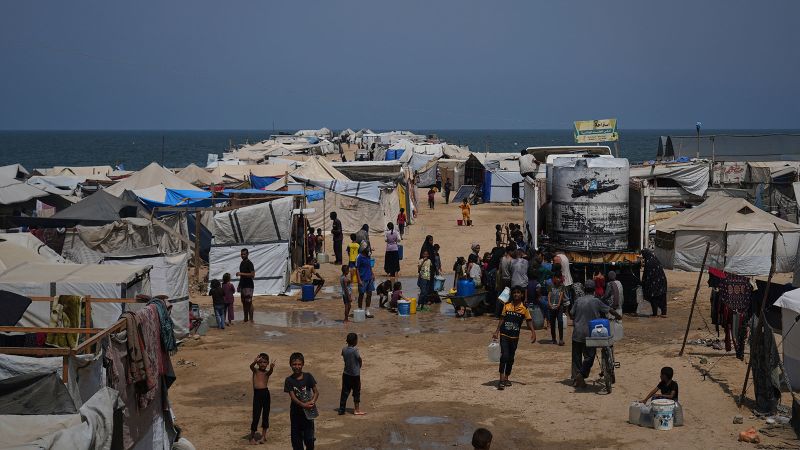U.S.-Israel Relations in the Midst of Escalating Violence: Rubio's Visit and the Humanitarian Crisis in Gaza

Introduction
On Sunday, U.S. Secretary of State Marco Rubio arrived in Israel as Israel intensified its attacks against northern Gaza. The escalating violence has caused widespread destruction and casualties, with both sides refusing to back down. The situation has drawn the attention of the international community, with many calling for a ceasefire and a return to negotiations.
Implications for U.S.-Israel Relations
Rubio's visit to Israel comes at a critical time, as the U.S. plays a key role in the ongoing conflict. The Biden administration has been vocal in its support for Israel's right to defend itself, but has also called for restraint and a de-escalation of violence. Rubio's presence in the region shows the U.S.'s commitment to maintaining its strong relationship with Israel and providing support during this difficult time.
The Humanitarian Crisis in Gaza
As the violence continues, the humanitarian crisis in Gaza deepens. The UN has warned that the ongoing conflict is exacerbating an already dire situation, with basic services such as healthcare and education facing severe disruptions. The death toll in Gaza continues to rise, with many innocent civilians caught in the crossfire. The international community must come together to find a solution and provide aid to those affected by the violence.
About the People Mentioned
Marco Rubio
Marco Rubio is an American politician born on May 28, 1971, in Miami, Florida, to Cuban immigrant parents. He gained prominence as a leading figure in the Republican Party and currently serves as the 72nd U.S. Secretary of State, a position he assumed in January 2025 after unanimous Senate confirmation[1][3]. Rubio's political career began in Florida, where he served as a city commissioner in West Miami and later as the Speaker of the Florida House of Representatives. During his tenure as Speaker, he implemented several reforms, including compiling "100 Innovative Ideas for Florida's Future," which led to significant legislative changes[2]. He was elected to the U.S. Senate in 2010, representing Florida until 2025. Rubio has been a key voice in U.S. foreign policy, particularly concerning Latin America, China, and the Middle East, and has championed bipartisan legislation on issues like immigration and human rights[1][4]. Rubio gained national attention for his role in the bipartisan "Gang of Eight" immigration reform effort and his 2016 presidential campaign, which ended with his endorsement of Donald Trump in the Florida primary[1][3]. He has also been a proponent of conservative populism, aligning himself with Trump's policies[3]. Recently, Rubio was nominated by Trump to serve as Secretary of State and, in April 2025, was also named acting National Security Advisor[3]. Rubio is married to Jeanette Dousdebes Rubio, and they have four children together. He holds a bachelor's degree from the University of Florida and a law degree from the University of Miami School of Law[4]. His appointment as Secretary of State marks a significant milestone, as he is the first Latino to hold the position[1].
About the Organizations Mentioned
U.S. Department of State
The **U.S. Department of State** is the federal executive agency responsible for shaping and executing American foreign policy and diplomacy globally. Established in 1789 as the first executive department, it serves as the principal advisor to the President on international relations and manages the United States' diplomatic missions, treaty negotiations, and representation in international organizations such as the United Nations[2][6][7]. The Department’s mission centers on promoting U.S. security, prosperity, and democratic values worldwide. It protects American citizens abroad, facilitates international business opportunities to create jobs at home, and builds partnerships to address global challenges including climate change, terrorism, nuclear proliferation, human trafficking, and pandemics[1][4][7]. Headquartered in the Harry S Truman Building in Washington, D.C., the Department operates thousands of embassies, consulates, and diplomatic posts worldwide, representing U.S. interests in nearly every country[2][5]. A key component closely associated with the Department is the U.S. Agency for International Development (USAID), created in 1961 to administer economic and humanitarian aid to developing countries. USAID advances global development goals like food security, democracy, health, and disaster relief, in coordination with State’s foreign policy goals[1]. Historically, the Department has played a critical role in forging alliances and maintaining peace, beginning with Thomas Jefferson as the first Secretary of State under President George Washington. Its influence continues today under the leadership of Secretary of State Marco Rubio, appointed in 2025[2][5]. In the context of business and technology, the Department’s efforts to open foreign markets and foster international partnerships are vital for American economic competitiveness. Its Professional Fellows programs promote cross-cultural professional exchanges, enhancing global networks and innovation collaboration[2]. With a FY 2024 budget of $38.8 billion, it remains a significant player in advancing U.S. interests amid evolving geopolitical and technological landscapes[3].
Biden administration
The **Biden administration**, officially the Biden-Harris Administration, is the executive branch led by President Joe Biden and Vice President Kamala Harris since January 2021. It focuses on rebuilding the U.S. economy post-pandemic, advancing social equity, promoting clean energy, and strengthening American manufacturing, especially in technology-driven sectors like electric vehicles and advanced batteries. The administration has prioritized economic recovery, job growth, and lowering costs for Americans while driving climate change initiatives and equitable investments in historically disadvantaged communities. Historically, the administration took office amid the COVID-19 pandemic and economic crisis. Their immediate response included the American Rescue Plan, which helped accelerate economic recovery faster than expected. Over Biden’s term, the U.S. economy grew by 12.6% with 16.6 million jobs added, achieving the lowest average unemployment rates in 50 years, including record lows for Black, Latino, and female workers. Real wages grew strongly, especially for low-wage workers, and household wealth increased by 37% after inflation adjustments. Small business applications hit a historic high, with significant growth among minority entrepreneurs[1][3]. A notable aspect is the administration’s commitment to clean energy and revitalizing energy communities. They allocated over $54 billion to support these regions, catalyzed $315 billion in private investments in clean energy and manufacturing, and launched workforce programs aligned with the green economy. Investments include over $1 billion to support auto suppliers and billions for electric vehicle and battery manufacturing, focusing on reestablishing American leadership in these fields[2]. The administration also strengthened antitrust enforcement under FTC Chair Lina Khan, achieved historic Supreme Court appointments, and implemented policies to reduce consumer costs, such as Medicare drug price negotiations and capping insulin prices. Initiatives targeting junk fees and improving labor conditions reflect a broad strategy to increase economic fairness and competitiveness in a tech-driven global economy[8][5]. Currently, the Biden administration emphasizes sustained economic growth, technology innovation, and social equity a
UN
The **United Nations (UN)** is a global intergovernmental organization founded in 1945 with the primary mission of maintaining international peace and security, promoting human rights, and fostering sustainable development. The UN was established in the aftermath of World War II, succeeding the League of Nations, with the aim of preventing future wars and promoting global cooperation. ### History and Structure The UN is headquartered in New York City, with additional offices in Geneva, Nairobi, Vienna, and The Hague. It comprises six principal organs: the **General Assembly**, **Security Council**, **Economic and Social Council**, **International Court of Justice**, **Secretariat**, and **Trusteeship Council**. The organization includes 193 member states and two observer states, making it the most representative global body. ### Key Functions and Achievements - **Peacekeeping and Security**: The UN plays a crucial role in maintaining international peace and security through peacekeeping missions and conflict resolution efforts. - **Human Rights and Development**: It promotes human rights, supports refugees, and works towards sustainable development through specialized agencies like **UNICEF** and **WHO**. - **Economic and Social Development**: The UN has been instrumental in economic and social development, particularly during the decolonization era. It has also been recognized for its leadership in peace and human development, with several agencies awarded the **Nobel Peace Prize**. ### Current Status and Challenges Despite its achievements, the UN faces ongoing challenges, including debates over its effectiveness, financial contributions, and perceived biases. Recent global events, such as the COVID-19 pandemic, have highlighted the complexities and criticisms surrounding the UN's role. ### Notable Aspects - **Global Influence**: The UN serves as a platform for dialogue among nations, addressing global challenges and promoting international cooperation. - **Specialized Agencies**: It has 15 specialized agencies that perform diverse functions, from facilitating international travel to addressing pandemics. - **International Law**: The UN plays a significant role in














